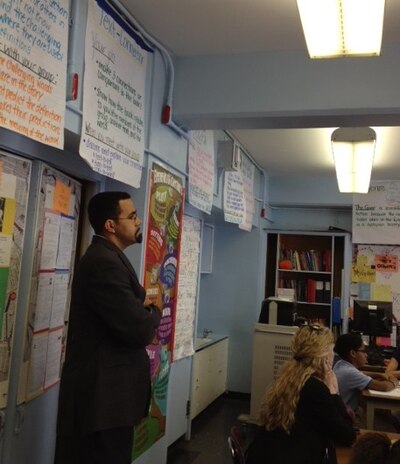
Hiring is set to resume at the 24 “turnaround” schools under an agreement city and union officials reached late Friday afternoon.
But the hiring decisions could be reversed if an arbitrator ultimately decides that the unions’ complaint — that the city is attempting to circumvent contractual hiring and firing policies at the schools — is valid.
The city teachers and principals unions sued to stop the hiring process, but on Wednesday, a State Supreme Court judge urged both sides to accept arbitration rather than pursue litigation. Today, the city and unions agreed “in principle” to seek arbitration, selected an arbitrator, and selected a first meeting date — June 5.
In the meantime, the city will continue the process of rehiring or replacing teachers at the schools — but will have to run the risk of having those decisions undone if the arbitrator rules in the unions’ favor.
The outcome of the contractual dispute could affect the state’s ability to approve those 24 schools for a pot of federal funds, Commissioner John King told reporters today.
King said he is still hoping to decide about the city’s applications for federal School Improvement Grant funding at the 24 schools in early June. But he also cautioned that the city might not be able to fulfill some of the promises made in the applications if the city-union dispute prohibits the city from carrying out its plans for the schools.
To be eligible for School Improvement Grants, “turnaround” schools are typically expected to meet a rigid set of expectations, including replacing veteran school leaders and replacing half their teaching staffs or more.
“In order to be able to do the turnarounds as they described it, they’ll need to get a resolution to the litigation,” King said. “One of the challenges is the level of discord between the city and the UFT. I think it is incumbent on both to figure that out.”
King said another area of the applications he is looking closely at is what programs the schools promise to offer students next year and beyond.
“Certainly in the School Improvement Grant program the idea is to match the spending to the needs of the students. As we look through the applications, we are looking for whether or not the city has good, clear plans for programs at the schools that will meet the needs of the student population,” he said.
But an agreement on new teacher evaluations would be a more straightforward path toward federal funding, King said.
“I think the best thing for the city will be if they can move forward on an evaluations deal with the UFT so they can access not only the School Improvement Grant funds but also some of the other Race to the Top funds,” he said.
Chancellor Dennis Walcott said yesterday that the city would prefer a teacher evaluation deal but would pursue other initiatives to improve teacher quality even without one.
Some critics of Walcott’s new proposals called them a distraction from the more pressing need for a teacher evaluation system. King’s response was more sympathetic.
“They’re in a difficult spot. The city wants to move forward on the teacher effectiveness initiatives and clearly they’ve had a hard time getting this resolution with the UFT,” he said. “They’re right to have a sense of urgency. I wouldn’t call this a distraction, but it is a small part of everything that needs to happen: an evaluation system that supports good professional development, and that teachers and principals buy into.”
King spent the morning touring the Upper West Side’s Dual Language Middle School with two top Department of Education officials, Shael Polakow-Suransky and Josh Thomases. The discussion focused on the rollout of new curriculum standards, known as the Common Core, and best practices for teaching English language learners. The middle school, which Walcott visited last month, has a high population of ELLs (35 percent) and special education students (25 percent), but consistently performs well on the city’s measures of student progress.
King and other city and state officials popped their heads into several English and math classes and watched a dance class with two dozen seventh-graders practice the mambo.
When King asked his guide, Principal Claudia Aguirre, the describe the biggest challenge the school faces, she did not hesitate before responding: “This is just hard work.”
She said teachers and administrators struggle with the added workload required to help high-needs students progress — work such as offering extra tutoring or grading multiple assignment revisions per student that other elementary schools may be able to forgo.
“How far can you push it? How many revisions can you do, and how much time can you spend in a day? My teachers are doing this work knowing that if they just go downstairs [to P.S. 84, which shares the building on 92nd street], they don’t have to do any of this.”
